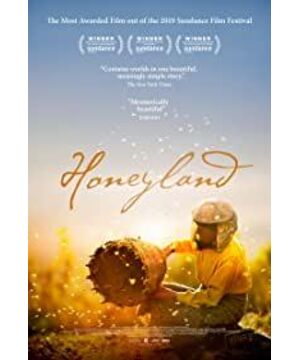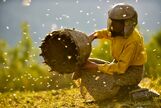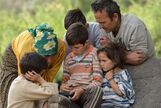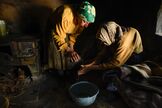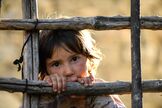Calvino mentioned a way of reading, watching the flowers, walking and enjoying. Before you open this book, you know nothing about it, you don’t have the initial impression, and you don’t invest too much judgment. Just observe quietly. That's what I was in when I watched this movie.
It's a very short film, but it's complete, small and beautiful, simple and poetic. The vast grasslands and small people, endless long roads and small cars, silhouettes in the sunset, and whispers in the dim hut in the film create a mysterious and melancholy atmosphere for the film; Arrival, the crying of the children and the busyness of the adults brought a thick smoke of fireworks. The wonderful combination of coming out of the dust and joining the WTO brings a rich experience to the viewers, but the picture and artistic conception are not the focus of my attention.
The film has almost no background music and is quiet most of the time, which gives us room to think. Letting my mind wander, here are the things that come to my mind:
At the beginning of the film, Hatiz went up the mountain to collect honey, "I take half, and the bees keep half." This way of thinking in harmony with nature reminds me of the old father in "Wolf Totem" who left half of the yellow sheep for the wolves. There are outsiders who do not follow the rules and destroy this natural harmonious beauty, which also leads to a certain degree of tragedy. This is the most external contradiction in the film. In fact, this conflict is the conflict between the primitive fishing and hunting production mode and the agricultural social production mode. In the primitive fishing and hunting mode of production, people rely on the sky for food and try not to destroy the ecological operation. People exist more as a part of the ecological environment, showing animality. People in the agricultural society began to transform nature. The Turkish father in the film set fire to the mountain, and the secretary Bao in the wolf totem wanted to change herds to farming. These are all invasions of the primitive society by the agricultural society. It is a reappearance of the scene of the agricultural revolution thousands of years ago. The difference is that the Turks in the film were finally forced to move out, and those who were forced to move out back then were only unable to compete with the rapidly growing and populous agricultural society. primitive tribe.
In addition to Hatiz and the Turkish family, there is another person in the film who promotes the honey tragedy, that is, a honey buyer from a Turkish family. I think, shadowy, the honey buyer may represent a new class after the Agricultural Revolution, the bourgeoisie. He used money to tempt the Turkish father to work for him, constantly trying to drain the honey from the Turkish family. It is a characteristic of modern society to speed up the operation of society through continuous incentives. Whether it is the fishing and hunting society of Hatiz or the agricultural society of the Turkish family, the greed for people is extremely restrained. Only in modern society, people can The greed and desire to consume are honored in a fair and open manner to encourage people to improve production efficiency through technological innovation. Regrettably, in the production environment of honey mining, the expression of modern society's squeeze is indeed exhausted.
Seriously, the most important protagonist of the film is neither Hatiz nor anyone else, but the bees, and everything revolves around bees and their honey. If we look at bees as people, the film has a completely different meaning. Theoretically speaking, no matter who it is, picking honey is considered a kind of stealing of wealth. After all, only bees are the creators of honey and hard workers. The upper-level rulers deprived the bees of the surplus value, the difference is only more or less. When the surplus value is exploited too much by the top, the bees at the bottom have nothing to do except symbolically sting the ruler twice. They can only cross the border to plunder the neighboring countries, or bring competitive pressure to the neighboring countries. Looking at the US and Mexico, one can't help but think of Trump's wall.
Leaving aside the rational analysis of the pros and cons, and returning to thinking about people, what the film leaves is short-term warmth and eternal loneliness.
Hatiz lived with her mother at first, and the pace of life was calm and slow. The arrival of the Turk was like a stone thrown into a pond, causing ripples in her life. She, who has never been married, really loves these children. She feeds them honey, takes them on swings, and listens to the radio together. Happiness will not be faked, she is really happy. But happiness is always short-lived, the children are gone and the mother is gone. Only Hatiz, who was shedding tears, sat alone in the setting sun and stared at it. The noise was over, and she fell into the net of loneliness again, just like each of us.
People are a link in the bloodline, with ancestors on the top and descendants on the bottom. Hatiz's mother passed away, and Hatiz buried her in the ground for her peace. Decades later, what about Hatiz himself, "who is he buried in the new year"? Maybe she will leave here and try to start a family and integrate into a society. The greater possibility is to continue to stay with the bees, be born in Sri Lanka, grow up here, and finally be here. The perception of life is an eternal topic of human literature, here I would like to end with a poem by Borges:
Destiny has no mercy
God's night has no end
Your body is just time, time that goes on and on
You are but every lonely moment
(PS: I lived alone, raised bees and made honey to make a living, and brought an old lady on the scene. Later, when the old lady died, she also had a good relationship with a little Zhengtai later. She was half a teacher...Is Hatiz counted? Low-profile little dragon girl)
I would also like to thank my neighbors for guiding such a great film~
View more about Honeyland reviews


